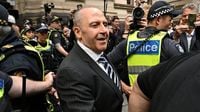In a remarkable turn of events, notorious Melbourne crime figure Tony Mokbel has been granted bail after nearly two decades behind bars. The 59-year-old, who was convicted for his role in a major drug trafficking operation, walked out of the Victorian Supreme Court of Appeal on April 4, 2025, greeted by cheers from supporters and a media frenzy.
Mokbel's release comes after the Court of Appeal labeled his case as “distinctly extraordinary,” allowing him to secure bail under strict conditions. Arriving at court in a fortified police BearCat vehicle, Mokbel was flanked by a significant security presence as he made his way into the courtroom. Clad in a sharp black pinstriped suit, he appeared anxious yet hopeful as he awaited the judges' decision.
Justices Karin Emerton, Robert Osborn, and Jane Dixon convened for a brief session, announcing their ruling around 10 a.m. Justice Emerton emphasized the exceptional nature of Mokbel's situation, stating that his forthcoming appeal on three significant drug charges—the Quills, Magnum, and Orbital cases—stood on solid ground due to recent disclosures related to the Lawyer-X controversy. This controversy revealed that Mokbel's former attorney, Nicola Gobbo, had acted as a police informant, undermining his defense.
“He’s a different person now,” Justice Emerton remarked, referencing Mokbel's deteriorating health and the unusual circumstances surrounding his legal battle. Mokbel's appeal is projected to conclude by late 2025, and he is currently eligible for parole in June 2031.
Mokbel's legal troubles began in earnest in the early 2000s when he emerged as a leading figure in a criminal organization known as “The Company,” which orchestrated extensive MDMA and methamphetamine trafficking operations. His downfall began in 2006 when he fled Australia aboard a yacht named The Edwena, only to be arrested in Greece the following year. After his extradition, he has been largely confined, save for rare medical trips and court appearances.
During the court proceedings, Mokbel's barrister, Julie Condon KC, argued that his guilty pleas in the 2000s were compromised by Gobbo's secret role as an informant. Condon described it as “inconceivable” that Mokbel would have admitted guilt had he known of the betrayal, branding it a “judicial travesty.” In a significant ruling last year, NSW Supreme Court Justice Elizabeth Fullerton concluded that Gobbo and several police officers had likely engaged in a “collaborative scheme” to undermine justice in their pursuit of Mokbel.
Following the court's decision, Mokbel was seen smiling as he exited the courthouse, where supporters had gathered in large numbers. He was quickly whisked away in a luxury vehicle, with plans to reside at his sister Gawy Saad's home in Melbourne's northeast. The bail conditions include GPS tracking, daily police reports, and a strict curfew, with Saad pledging to report any violations immediately.
As Mokbel prepares for life outside prison, he faces significant challenges. His health has reportedly declined during his incarceration, and he remains under heavy scrutiny. The last time he experienced freedom was in 2007, after which he was involved in a severe prison assault that left him with a brain injury.
In court, Mokbel expressed his desire to reconnect with his family, indicating that the first two things he plans to do upon his release are to see his children and visit his mother’s grave. His supporters, some of whom were seen leaving the court in flashy vehicles, displayed palpable excitement at his release.
The decision to grant Mokbel bail has sparked discussions about the integrity of the justice system, particularly in light of the revelations surrounding Gobbo's actions. The court found that Mokbel had been “deliberately misled and deceived” regarding the evidence against him, raising questions about the fairness of his previous convictions.
As Mokbel embarks on this new chapter of his life, he remains committed to fighting his convictions. The appeal process is expected to unfold later this year, with his legal team optimistic about the outcome. If successful, Mokbel could see his convictions quashed entirely, paving the way for a complete release from his lengthy sentence.
With the eyes of the public and media firmly fixed on him, Mokbel's journey from crime lord to a man seeking redemption is far from over. The implications of his case resonate beyond his personal narrative, touching on broader issues of legal ethics and the role of informants in the criminal justice system.
As the dust settles from this significant legal battle, one thing remains clear: Tony Mokbel's story is far from finished, and the unfolding drama surrounding his appeal will undoubtedly capture the attention of many in the months to come.








